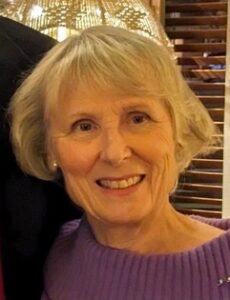
Diana Reynolds Roome is an award-winning writer and editor and a former editor at the Stanford Graduate School of Business for academic papers and case studies.
—————————————————————
My first hazy doubts about William Shakespeare’s identity came about due to my intense devotion to the Stratford Bard. I was seventeen and managed to get a summer job as a guide at the Shakespeare Birthplace in 1963. This was a thrill, until I was given a rough script of what to say to the crowds of tourists who surged into the stone-flagged hall, gazing at me curiously.
The problem was, I had barely a thimble full of information to convey about Shakespeare’s early and later life in Stratford. I’d been studying his plays for a couple of years at school and was already a passionate devotee. So I’d expected to find out a great deal more about him while I was in this renowned town, but aside from the superb productions at the Royal Shakespeare Theatre, little was forthcoming. When addressing the tourists, I was reduced to pointing out the sturdy wattle-and-daub structure of the house and the signatures of later literary celebrities engraved into the glass, along with my list of “probabilities” or“possibilities” about William’s life here, in childhood and retirement.
The following summer of 1964, I returned to Stratford to work at The Festival Club, housed at Hall’s Croft, the house where William’s daughter Susannah lived with her husband Dr. John Hall. I had a lowly job as a waitress in the restaurant there, and before work one morning I was in high spirits, with the 400-year official birthday celebrations due to start the next day. Sitting on the grass by the Avon, I’d written a verse and had enough time to meander around Holy Trinity Church, still in a mood of enchantment. But when I got to Shakespeare’s tomb, all my exuberance vanished. That evening I wrote in my journal: “It will be rather odd when all the festivities begin to think of the real Shakespeare lying under that slab, quite silent and cold in the empty church, with everyone outside unfurling flags, shouting and cheering, quite forgetting the person who is at the hub of it all. That simple, cold tomb … seems as if it was vacated long ago.”
Of course, I had no inkling then of anyone other than WS of Stratford being the author of the plays, or that there might be no bones under that slab. Nevertheless, I was chilled by an almost palpable sense of absence that overcame me that day in the church.
Almost fifty years later (having moved to the US in 1980), I was living just outside Ashland – lured here largely by the Oregon Shakespeare Festival. I’d heard of authorship doubts but dismissed the notion as ridiculous. Out of curiosity, I went to hear Earl Showerman speak, and emerged reluctantly questioning. Over the next years, conferences arranged by Earl and the Shakespeare Oxford Fellowship brought together many serious researchers and scholars whose arguments for Edward de Vere as the author of Shakespeare’s works seemed increasingly plausible. I was surprised and a little resistant to my own growing questions about the Stratford man, especially as my friends in England thought my doubts absurd. Then I met Michael Cecil, Marquis of Exeter, who showed me his inherited original copy of “The Little Book of Precepts,” his ancestor William Cecil’s advice to his son Thomas, with its startling resemblance to Polonius’s advice to Laertes as he left for Paris University. I knew by then that this ancestor, also known as Lord Burghley, had become Edward’s official guardian after his father died and his mother remarried.
Recently, a document came into my possession that showed how a close branch of my family traced back to Arthur Golding, a renowned translator of Latin texts. To my astonishment, I saw that his sister Margaret married the 16 th Earl of Oxford and became Edward’s mother. So my ancestor was not only uncle to Edward de Vere, but he was living and working in Lord Cecil’s household on the Strand at the same time as the teenage Edward was a ward there. Arthur dedicated several of his texts to Edward, but his primary scholarly work was the first translation from Latin of Ovid’s Metamorphoses, and Shakespeare’s deep familiarity with this work is undisputed.
Seeing Edward de Vere’s name linked so closely with Arthur Golding, a direct ancestor of my own Uncle Edward Golding, was like a message from history. The brilliant young student could well have been privy to or even involved in the birth of his uncle’s translations. I imagined the two of them sitting together in Cecil’s massive library, reputedly even better stocked than Queen Elizabeth’s. Shakespeare’s evident fascination with classical texts may have begun here. As for my own conviction about who wrote under that name, the election lights on Edward de Vere.
“How I Became an Oxfordian” is edited by Bob Meyers. You may submit your essay on this topic (500 words or fewer in an editable format such as MS Word), along with a digital photo of yourself, to: communications@shakespeareoxfordfellowship.org. Also include a sentence about yourself (e.g., “Jane J. Smith is a businesswoman in San Francisco.”).


